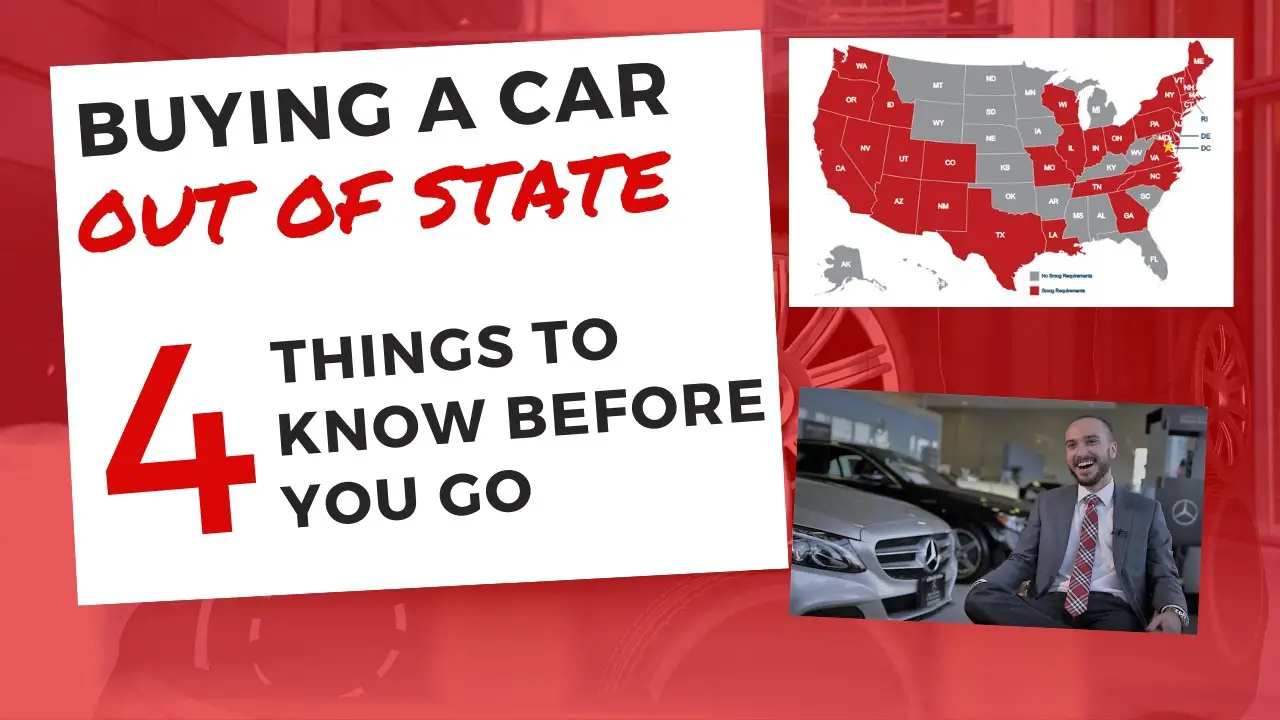Buying a car out of state can be more complex and costly due to transportation expenses and potential inspection requirements. However, it is possible to purchase a car from another state and bring it to Texas by providing necessary documentation at the DMV.
You may need to pay the difference in sales tax if your home state has higher rates. It’s important to inform the DMV that you bought the car out of state and intend to register it in your own address.
This process typically involves showing proof of insurance, residency, and a bill of sale. Understanding the steps involved can help streamline the process of buying a car out of state and ensure a smooth registration experience.
The Allure Of Interstate Auto Deals
The prospect of buying a car out of state often presents a tantalizing opportunity. The allure of interstate auto deals lies in the potential to access a wider range of vehicles and potentially secure cost benefits that may not be available locally.
Cost Benefits
When considering purchasing a car out of state, one of the most compelling factors is the potential for cost savings. Oftentimes, certain states may have lower taxes, registration fees, or overall vehicle prices, allowing buyers to capitalize on significant financial advantages.
Additionally, competitive pricing in different markets can offer lucrative opportunities for savvy buyers looking to make the most of their budget.
Broader Selection
Another enticing aspect of interstate auto deals is the access to a broader selection of vehicles. By expanding the search beyond local boundaries, buyers can explore a diverse array of makes, models, and specifications.
This expanded choice can empower individuals to find the perfect vehicle that aligns with their preferences and requirements, ultimately enhancing the overall car purchasing experience.
Preliminary Steps Before You Leap
Before buying a car out of state, there are several crucial preliminary steps to take to ensure a smooth transaction and avoid potential pitfalls.
Research The Vehicle
- Research the vehicle’s history to avoid any unpleasant surprises.
- Check for any outstanding recalls that may affect the safety or performance of the car.
- Verify the market value of the vehicle to determine if the price is fair.
Verify Seller Credibility
- Check the seller’s reputation through online reviews or forums.
- Ask for references or feedback from previous buyers.
- Confirm the seller’s identity and contact information for security.
Navigating Tax Implications
When buying a car out of state, it’s crucial to navigate the tax implications to ensure a smooth and compliant transaction. Understanding the sales tax, handling tax discrepancies, and knowing your state’s specific tax regulations are essential for a hassle-free purchase.
Understanding Sales Tax
Before purchasing a car out of state, it’s important to understand the sales tax implications. Different states have varying sales tax rates and regulations, so it’s vital to research and comprehend the tax requirements of both the state where you are buying the car and your home state.
You may be required to pay the sales tax in the state of purchase and then settle any differences when registering the vehicle in your home state.
Handling Tax Discrepancies
Dealing with tax discrepancies can be a complex process when buying a car out of state. If the sales tax you paid in the state of purchase is lower than your home state’s tax rate, you will likely need to pay the difference when registering the vehicle in your home state.
Conversely, if the sales tax paid is higher, you may be eligible for a refund or credit from your home state. It’s essential to be aware of these potential discrepancies and ensure you have the necessary documentation to facilitate the registration process in your home state.
:max_bytes(150000):strip_icc()/buying-a-car-in-a-different-state-4148015-Final2-1a901895477c4c518d48407644568ce8.png)
Credit: www.thebalancemoney.com
Cross-state Purchase Procedures
Buying a car out of state can be a great way to find the perfect vehicle at a lower price, but it can also be a bit more complicated than buying a car in your home state.
When it comes to purchasing a car out of state, there are certain procedures that you need to follow in order to ensure a smooth and legal transaction.
Securing A Bill Of Sale
One of the most important steps in buying a car out of state is securing a bill of sale. This document will serve as proof of your purchase and will include important information such as the vehicle identification number (VIN), purchase price, and the names and addresses of both the buyer and seller.
Make sure that the bill of sale is signed by both parties and that you keep a copy for your records.
Title Transfer Essentials
In addition to the bill of sale, you will also need to transfer the title of the vehicle to your name. This process will vary depending on the state where you purchased the car, but in general, you will need to provide proof of ownership, such as the bill of sale, and pay any applicable taxes and fees.
Once the title transfer is complete, you will be able to register the vehicle in your home state. It’s important to note that some states require additional documentation or inspections before they will issue a title or registration for an out-of-state vehicle.
Before you make your purchase, be sure to research the specific requirements of your home state to avoid any delays or complications. Buying a car out of state can be a great way to find the perfect vehicle at a lower price, but it’s important to follow the proper procedures to ensure a legal and hassle-free transaction.
By securing a bill of sale, transferring the title, and complying with any additional requirements of your home state, you can drive your new car home with confidence.
Transporting Your New Purchase
When buying a car out of state, consider the extra steps involved in transporting it home. Factor in potential inspection requirements and registration processes to ensure a smooth transition to your local DMV. Planning ahead can help you avoid any unexpected delays or complications.
Choosing A Shipping Company
When it comes to transporting your new out-of-state car purchase, you have two options: hiring a shipping company or driving it home yourself. If you opt for the former, it’s crucial to choose a reputable shipping company.
Look for companies with good reviews and a proven track record of delivering cars safely and on time. Be sure to ask about insurance coverage and any additional fees or charges.
Road Trip Considerations
If you decide to take a road trip and drive your new car home, there are a few things to consider. First, make sure the car is roadworthy and has been thoroughly inspected before hitting the road. Plan your route ahead of time and be prepared for unexpected delays or detours.
Bring along a map, GPS device, and emergency kit just in case. It’s also important to factor in the cost of gas, food, and lodging, as well as any tolls or other fees you may encounter along the way.
Whether you choose to ship your new car or drive it home, transporting an out-of-state purchase requires careful planning and consideration. By choosing a reputable shipping company or preparing for a road trip, you can ensure a smooth and stress-free experience.
Inspection And Emissions Requirements
When buying a car out of state, it’s crucial to understand the inspection and emissions requirements that may vary from state to state. Failure to comply with these requirements can lead to potential issues with registering the vehicle in your home state.
State-specific Criteria
Each state has its own specific criteria for vehicle inspections and emissions requirements. It’s important to research and understand the regulations of the state from which you are purchasing the car. This includes knowing the specific tests and standards that the vehicle must meet to pass the inspection.
Arranging For Inspection
Upon purchasing a car from another state, it’s essential to arrange for an inspection to ensure that it meets your home state’s requirements. This may involve finding a certified inspection facility or mechanic who can assess the vehicle’s condition and emissions. Additionally, you may need to obtain an emissions test to verify that the car complies with environmental standards.
Registration And Insurance
When buying a car out of state, navigating the process of registration and insurance is crucial. It involves gathering necessary documents and scheduling DMV appointments.
Gathering Necessary Documents
Before heading to the DMV, ensure you have the essential documents handy:
- Photo ID
- Proof of residency
- Proof of insurance
- Bill of sale
- Vehicle title
Navigating Dmv Appointments
Booking an appointment with the DMV is vital for registering your out-of-state vehicle. Here’s what to expect:
- Inform the clerk about the out-of-state purchase.
- Provide all necessary documents for verification.
- Complete any required forms provided by the DMV.
- Pay the registration fees and taxes.
- Receive your new registration and license plates.
Temporary Tags And Permits
When buying a car out of state, acquiring temporary registration is a crucial step in the process. Temporary tags and permits allow you to legally drive the vehicle until you can complete the registration process in your home state. Here’s what you need to know about acquiring temporary registration and complying with interstate travel regulations.
Acquiring Temporary Registration
Acquiring temporary registration involves obtaining a temporary tag or permit from the state where the vehicle was purchased. This temporary registration allows you to drive the vehicle legally until you can complete the permanent registration process in your home state.
The process for acquiring temporary registration varies by state, so it’s important to research the specific requirements and procedures of the state where the vehicle was purchased.
Interstate Travel Compliance
When driving a car out of state, it’s essential to ensure compliance with interstate travel regulations. This includes adhering to the temporary registration requirements of the state where the vehicle was purchased and any additional regulations for driving across state lines.
It’s important to familiarize yourself with the temporary registration validity period and any restrictions on interstate travel to avoid potential legal issues.
Common Pitfalls And How To Avoid Them
When buying a car out of state, it’s crucial to be aware of common pitfalls that could potentially turn your purchase into a nightmare. By understanding these issues and taking proactive steps to avoid them, you can ensure a smooth and successful car-buying experience.
Scams And Fraudulent Listings
One of the major risks when purchasing a car out of state is falling victim to scams or dealing with fraudulent listings. To protect yourself, always conduct thorough research on the seller and the vehicle.
Verify the legitimacy of the listing by requesting additional photos and vehicle history reports. Avoid deals that seem too good to be true or involve high-pressure sales tactics.
Title Washing Issues
Title washing is another common problem that buyers may encounter when purchasing a car out of state. This deceptive practice involves altering a vehicle’s title to conceal its true history, such as previous damage or salvage status.
To prevent falling victim to title washing, always obtain a vehicle history report and have the title thoroughly inspected by a trusted professional before finalizing the purchase.

Credit: www.creditkarma.com
Post-purchase Tips
Once you’ve bought a car from out of state, there are a few important considerations to keep in mind to ensure that your out-of-state vehicle remains in good condition and retains its value.
Maintaining Out-of-state Vehicles
Regular Maintenance: Schedule regular maintenance checks and servicing to keep your out-of-state car in top condition. This includes oil changes, tire rotations, and inspections.
Local Repair Shops: Find reliable local repair shops that are familiar with servicing out-of-state vehicles to address any issues that may arise.
Check Local Regulations: Stay informed about local regulations and emissions standards to ensure your vehicle remains compliant.
Resale Value Considerations
Market Research: Before selling your out-of-state car, research the local market to understand its resale value in your area.
Vehicle History Reports: Obtain and maintain comprehensive vehicle history reports to provide potential buyers with transparent information about the car’s background.
Documentation: Keep all documentation related to the vehicle, including maintenance records, for a smooth resale process.

Credit: www.pnc.com
Frequently Asked Questions
What Are The Disadvantages Of Buying A Car Out Of State?
Buying a car out of state can be complex and costly, with additional inspection and registration requirements.
Can I Buy A Car From Another State And Bring It To Texas?
Yes, you can buy a car from another state and bring it to Texas. You’ll need a bill of sale, photo ID, proof of residency, and insurance. Inform the DMV that you bought the car out of state and intend to register it in Texas.
Do I Have To Pay Taxes Twice If I Buy A Car Out Of State In Texas?
No, you don’t pay taxes twice when buying a car out of state in Texas. The dealer collects sales tax, adjusting for any difference in your state’s rates.
Can I Buy A Car In Another State And Register It In New York?
Yes, you can buy a car in another state and register it in New York. You’ll need to follow the DMV’s instructions for registering an out-of-state vehicle.
What Are The Disadvantages Of Buying A Car Out Of State?
Buying a car out of state may be more complex and costly due to transportation and inspection requirements.
Conclusion
Buying a car out of state can be a viable option for some, but it comes with potential complications. Additional costs and paperwork may offset any initial savings. It’s crucial to research the specific requirements for bringing the car to your state and ensure compliance with all legal and regulatory obligations.

